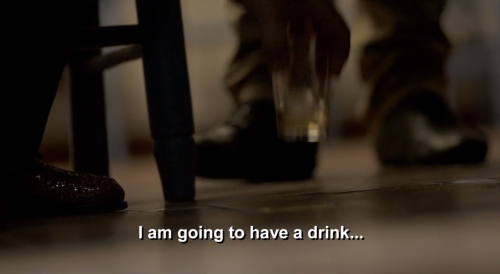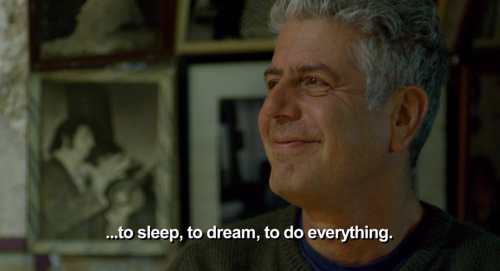Anthony Bourdain - Blog Posts
From Anthony Bourdain:
Americans love Mexican food. We consume nachos, tacos, burritos, tortas, enchiladas, tamales and anything resembling Mexican in enormous quantities. We love Mexican beverages, happily knocking back huge amounts of tequila, mezcal, and Mexican beer every year. We love Mexican people—we sure employ a lot of them.
Despite our ridiculously hypocritical attitudes towards immigration, we demand that Mexicans cook a large percentage of the food we eat, grow the ingredients we need to make that food, clean our houses, mow our lawns, wash our dishes, and look after our children.
As any chef will tell you, our entire service economy—the restaurant business as we know it—in most American cities, would collapse overnight without Mexican workers. Some, of course, like to claim that Mexicans are “stealing American jobs.”
But in two decades as a chef and employer, I never had ONE American kid walk in my door and apply for a dishwashing job, a porter’s position—or even a job as a prep cook. Mexicans do much of the work in this country that Americans, probably, simply won’t do.
We love Mexican drugs. Maybe not you personally, but “we”, as a nation, certainly consume titanic amounts of them—and go to extraordinary lengths and expense to acquire them. We love Mexican music, Mexican beaches, Mexican architecture, interior design, Mexican films.
So, why don’t we love Mexico?
We throw up our hands and shrug at what happens and what is happening just across the border. Maybe we are embarrassed. Mexico, after all, has always been there for us, to service our darkest needs and desires.
Whether it’s dress up like fools and get passed-out drunk and sunburned on spring break in Cancun, throw pesos at strippers in Tijuana, or get toasted on Mexican drugs, we are seldom on our best behavior in Mexico. They have seen many of us at our worst. They know our darkest desires.
In the service of our appetites, we spend billions and billions of dollars each year on Mexican drugs—while at the same time spending billions and billions more trying to prevent those drugs from reaching us.
The effect on our society is everywhere to be seen. Whether it’s kids nodding off and overdosing in small town Vermont, gang violence in L.A., burned out neighborhoods in Detroit—it’s there to see.
What we don’t see, however, haven’t really noticed, and don’t seem to much care about, is the 80,000 dead in Mexico, just in the past few years—mostly innocent victims. Eighty thousand families who’ve been touched directly by the so-called “War On Drugs”.
Mexico. Our brother from another mother. A country, with whom, like it or not, we are inexorably, deeply involved, in a close but often uncomfortable embrace.
Look at it. It’s beautiful. It has some of the most ravishingly beautiful beaches on earth. Mountains, desert, jungle. Beautiful colonial architecture, a tragic, elegant, violent, ludicrous, heroic, lamentable, heartbreaking history. Mexican wine country rivals Tuscany for gorgeousness.
It's archeological sites—the remnants of great empires, unrivaled anywhere. And as much as we think we know and love it, we have barely scratched the surface of what Mexican food really is. It is NOT melted cheese over tortilla chips. It is not simple, or easy. It is not simply “bro food” at halftime.
It is in fact, old—older even than the great cuisines of Europe, and often deeply complex, refined, subtle, and sophisticated. A true mole sauce, for instance, can take DAYS to make, a balance of freshly (always fresh) ingredients painstakingly prepared by hand. It could be, should be, one of the most exciting cuisines on the planet, if we paid attention.
The old school cooks of Oaxaca make some of the more difficult and nuanced sauces in gastronomy. And some of the new generation—many of whom have trained in the kitchens of America and Europe—have returned home to take Mexican food to new and thrilling heights.
It’s a country I feel particularly attached to and grateful for. In nearly 30 years of cooking professionally, just about every time I walked into a new kitchen, it was a Mexican guy who looked after me, had my back, showed me what was what, and was there—and on the case—when the cooks like me, with backgrounds like mine, ran away to go skiing or surfing or simply flaked. I have been fortunate to track where some of those cooks come from, to go back home with them.
To small towns populated mostly by women—where in the evening, families gather at the town’s phone kiosk, waiting for calls from their husbands, sons and brothers who have left to work in our kitchens in the cities of the North.
I have been fortunate enough to see where that affinity for cooking comes from, to experience moms and grandmothers preparing many delicious things, with pride and real love, passing that food made by hand from their hands to mine.
In years of making television in Mexico, it’s one of the places we, as a crew, are happiest when the day’s work is over. We’ll gather around a street stall and order soft tacos with fresh, bright, delicious salsas, drink cold Mexican beer, sip smoky mezcals, and listen with moist eyes to sentimental songs from street musicians. We will look around and remark, for the hundredth time, what an extraordinary place this is.











megan nolan / fernando amorsolo / chelsea g. summers / saria dy / virginia woolf / jan davidsz. de heem / @littlewomenatelier / joy harjo / eat drink man woman / anthony bourdain
Couldn't have said it better myself! 🙏🍷

“Eat at a local restaurant tonight. Get the cream sauce. Have a cold pint at 4 o’clock in a mostly empty bar. Go somewhere you’ve never been. Listen to someone you think may have nothing in common with you. Order the steak rare. Eat an oyster. Have a negroni. Have two. Be open to a world where you may not understand or agree with the person next to you, but have a drink with them anyways. Eat slowly. Tip your server. Check in on your friends. Check in on yourself. Enjoy the ride."
~ Anthony Bourdain
Parts Unknown
Only 7 days remain to watch the some of the still streaming Parts Unknown with Anthony Bourdain episodes before they are removed from Netflix (in the US--December 26th).
With 8 episodes per season and 5 seasons listed (seasons 7-11) it is possible to binge in the last remaining days. However, to get at the soul of Anthony Bourdain and his series of using food to show off the different parts of the world I would recommend these seven
1. The Greek Islands (Season 7 episode 3)
2. Houston (Season 8, episode 5)
3. Minas Gerias, Brazil (Season 8, episode 7)
4. Laos (Season 9, episode 3)
5. Antartica (Season 9, episode 5)
While I haven’t seen it yet, given that we are now living in seven months of Chinese unrest with the Hong Kong protests
6. Sichuan with Eric Ripert (Season 8, episode 3)
7. Hong Kong (Season 11, episode 5)
**As previously mentioned, Buenos Aires (Season 7, episode 8) he shared a lot about his opinions and story about mental health**
Parts Unknown
Libraries are not just about books and education; sometimes a connection doesn’t come from a written word or common experience but the opening up of one’s experiences and becoming vulnerable. Libraries have all different mediums for these connections and sometimes the break in the sentence, flutter in the eye you experience directly adds to the depth of the spoken word that cannot be expressed by their writing. Diversity in writing, community and stories includes diversity of media.
Ugh; Anthony Bourdain’s Buenos Aires episode. I hope you can hear us all now, you did so much more than just shove food in your mouth.
Highlighting the significance of how the food is prepared to the culture and history and individual--it’s why the show wasn’t called something generically--food “Unknown”, but parts unknown.
Parts of diets we don’t know of, parts of the world we don’t know of, parts of ourselves we don’t know of.
Thank you, I miss you--> I’ve been missing you







